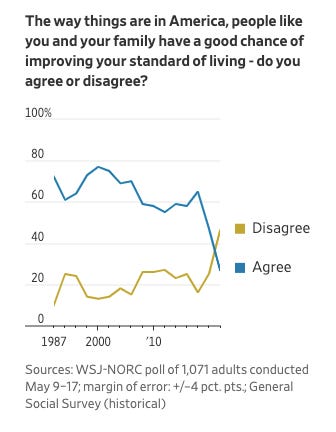A new poll from Wall Street Journal-NORC came out this week, and the results could hardly be worse. Despite wage growth and low unemployment, an overwhelming 83 percent of poll respondents “described the state of the economy as poor or not so good.” 35 percent said that they “aren’t satisfied at all with their financial situation,” the highest proportion ever recorded in the half century since the NORC first started asking that question in 1972. Inflation trumps all for the average American, and the national economic mood is dreadful.
With midterm elections coming up this November, this is more bad news for Democrats facing already bleak prospects. Wednesday afternoon, a new Morning Consult poll clocked President Biden’s approval rating at just 39 percent, the lowest he’s ever received as president. For comparison, Donald Trump sat at 45 percent approval at the same point in his presidency four years ago. As Democratic strategist Doug Sosnik told the New York Times, “it’s going to be a terrible cycle for Democrats.”
But it’s not just Democrats that need to worry. Economic despair goes beyond threatening the party in power—it threatens democracy writ large. If recent history is any indication, this crisis will further sideline moderates in the Democratic and Republican parties in favor of politicians more willing to sharpen their spears and denounce the American system as fundamentally broken. When moderate politicians can’t deliver, the American electorate looks elsewhere.
Rise of the Radicals
America is facing its greatest economic woes since the Great Recession, which itself remade American politics. The Tea Party, which arose in 2009 as the financial crisis unraveled, turned the long-simmering populist wing of the Republican party into a powerful political faction. Before long, the voters outgrew libertarian fiscal conservatism in favor of Donald Trump’s slash-and-burn politics.
Disaffected progressives, meanwhile, coalesced around the Occupy Wall Street movement, drawing socialists into the American mainstream for the first time in decades. By 2016, the self-described democratic socialist Bernie Sanders was a serious contender for the presidency, and in 2018 The Squad stormed into Congress promising to remake the Democratic party.
Back in 2016, the Harvard economist Dani Rodrik remarked that the rise of these movements “is the populist backlash that unremitting globalization has historically unleashed…When mainstream politicians are unable to generate meaningful responses to inequality, social exclusion and insecurity, populists of various ilk gain ground.”
Rodrik identified four trends which coalesced in both the left-wing and right-wing populst movements: anti-globalization, anti-free-trade, anti-immigration and anti-Wall Street sentiment. Now with our economic outlook souring, these trends could go into overdrive.
State of the Crisis
The inflationary crisis comes on the back of decades of stagnant wage growth for middle-income households. While the American economy has soared over the past few decades, the average workers’ real wage has gone up just 0.2 percent per year on average since 1978. Since the beginning of the pandemic, real wages for the bottom 10th percentile have declined 3-4 percent, while those for the top 10th percentile have risen about 5 percent.
As inflation worsens, middle and lower-income Americans are set to suffer most. A study from the Washington Post found that low-income households tend to spend a greater share of their income than high-income earners in almost all of the categories where prices are increasing most quickly.
Now, economists are warning that the United States could slip into a recession next year, creating fertile ground for a new wave of populist candidates to upend American politics. According to a paper from the Federal Reserve Bank of Dallas in 2014, income inequality and political polarization are mutually reinforcing. The most likely explanations for this relationship are that income inequality may weaken our sense of shared destiny, increase the political influence of the most wealthy, and foster a sense that political opponents don’t have other Americans’ best interest at heart.
And it’s not just American politics that could be radicalized by moderate politicians failing to curtail these economic trends. According to a recent report from the World Bank, global economic growth is set to halve from 5.7 percent last year to just 2.9 percent in 2022. Exacerbated by the war in Ukraine, trade disruptions, and ballooning national debts, the world faces a serious risk of stagflation—or stagnant economic growth in an inflationary environment—which renders stimulus efforts from national banks self-defeating. The potential anti-democratic backlash would be worst in the countries hit hardest.
No Time for Inaction
Americans’ perception of the economy in the new Wall Street Journal-NORC poll spells bad news for how an economic downturn could radicalize our politics, but another question shows how it’s already playing out. When asked whether people like them have a good chance of getting ahead in America, respondents were more negative than they ever have been before, dating back to 1987.

The American dream is under threat, and to many Americans, it’s in its death throes. The crisis is here, and moderates have failed to find a broad economic message that can counter populists’ anti-elite appeal. While the economy was expanding, we could defer that answer for a while. But now with rising inflation and the threat of a broader economic recession, moderates’ time to find a solution may be running out.


